9 tips for managing your mental health condition whilst looking for work
9 tips for managing your mental health condition whilst looking for work
Before anything else, if you’re living with mental ill-health, it’s important to seek the help of a medical professional. Your doctor is a good place to start. They can recommend the appropriate next steps to keep your mental health in check, including prescription medication and referrals to appropriate services. You can also check out Beyond Blue’s directory of national health professionals to find support suited to your needs.
When you’re ready to get started with your job search, then keeping the following tips in mind should help support your mental health whilst job hunting.
1. Get personalised support from job search experts
If you’re living with a mental health condition, you may be eligible for government-funded Disability Employment Services (DES). If you’re not already registered with an employment services provider like CoAct, then get in touch with us to find out how we may be able to help you with your job search. You can also take this quick quiz to see if you may be eligible for DES.
If you choose CoAct as your DES provider, at your first Welcome to CoAct meeting you’ll be met by a friendly local Employment Consultant who will take the time to understand your challenges, interests and goals. We ask the right questions from the start so that we can work with you to create a job search support plan tailored to your unique needs.
2. Think about what kind of workplace you’d be happiest in
Do you like being around other people or prefer to work independently? In an office or outdoors? What tasks would you like to be doing? You can discover what jobs you are most suited to by finding out what job cluster you best fit here.
3. Break down your goals
‘Getting a job’ sounds like a pretty obvious goal if you’re looking for work, but breaking it down into smaller, bite-size goals will help keep you positive and motivated along the way – even when it seems tough. It also makes the big goal less daunting, more achievable and give you more reason to celebrate along the way. Your CoAct Employment Consultant will help create a plan for you to chip away at mini-goals – such as sending a certain amount of cover letters in a week or making X phone calls to prospective employers.
4. Be open and honest about what you want without fear of judgement
Your CoAct Employment Consultant will take the time to chat to you about your wish list, goals, skills and experience and create a suitable job plan. This is your opportunity to be honest about what you really want and how you’d like to get there. The more they know about you, the easier it’ll be for them to match you to potential opportunities and provide the right support.
5. Think out of the box
There are all sorts of part-time, casual or even volunteering roles that may be a good starting point if you’re not ready to work full-time. Have an open mind and think about what kind of work will be most achievable for you to manage with your condition.
6. Don’t be afraid to ask for help with job applications
Your Employment Consultant will help you look for suitable roles and are always in touch with local employers to find out what opportunities are around. When you see opportunities you like the look of, your consultant will be able to assist you with the application process, including help writing your cover letter and resume and interview tips if you need them.
7. Have some day-to-day structure
If and when you can (and we know it’s not always that easy or simple), try and get out of bed at the same time, have a good breakfast and perhaps get some appropriate exercise. Then get dressed just like you would if you were going to work and hit your job search. Take regular breaks and like any other structured day, be sure to create some space for personal time, too. Structuring your days will help give you a greater sense of purpose and achievement and help boost your mood.
8. Listen to your mind and your body
Mental ill-health isn’t just a 9-5 thing and can often change directions at a moment’s notice and for many reasons (or no reason at all). Remember to practise mindfulness, be in tune with what your mind and body is telling you and don’t be afraid to communicate this with your support network (including your Employment Consultant).
9. Learn from the process and be patient
If all your hard work doesn’t end with a job offer, don’t lose hope. You’ll have learned a lot from the process that you can use in future applications – and you never know what’s around the corner.
Where to get help
If you or someone you know is in danger or needs immediate medical attention, please call 000.
If you are thinking about suicide or experiencing a personal crisis help is available.
No one needs to face their problems alone. Call Lifeline 24/7 on 13 11 14. The people at Lifeline Australia are available 24 hours a day, 7 days a week to talk to those struggling with depression or thoughts of self-harm. Call 13 11 14 to talk to someone anytime. The staff there specialise in crisis support and suicide prevention. Visit https://www.lifeline.org.au/ for more information.
Beyond Blue offers some great resources on dealing with depression and suicidal thoughts. Whether you are suffering yourself, or love someone who is, they have information to help you in your journey. Visit https://www.beyondblue.org.au/ for more information.
Tailored job search support with your mental health in mind
The team at CoAct understands how difficult it can be to find and keep a job if you are living with mental ill-health. We specialise in working with you to support you through these challenges so that you can find a job that suits your needs. We provide you with the mentoring, training support and guidance you need to thrive at work.
We also work closely with employers across Australia to ensure people with mental health conditions are supported in the workplace, meaning you’re set up to succeed from the start.
Post categories
- Employers (20)
- Job seeker tips (172)
- News (56)
- Real stories (144)
- Referral partners (1)







